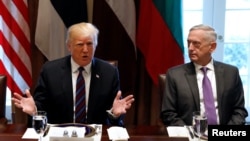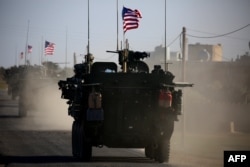The United States is pushing its allies and partners across the Middle East to ramp up their efforts to destroy the Islamic State terror group, saying the involvement of U.S. forces in Syria is “coming to a rapid end.”
The pronouncements from the White House come a day after President Donald Trump publicly repeated his desire to bring home the approximately 2,000 U.S. troops stationed in Syria, even as top military officials signaled the mission there was not near completion.
“The military mission to eradicate ISIS in Syria is coming to a rapid end, with ISIS being almost completely destroyed,” the White House said in a statement Wednesday, using an acronym for the Islamic State (IS) terror group.
WATCH: Analysts take on US-Syria relations
“The United States and our partners remain committed to eliminating the small ISIS presence in Syria that our forces have not already eradicated,” it continued. “We will continue to consult with our allies and friends regarding future plans.”
Pressed on what that meant for U.S. forces still in the region, White House Press Secretary Sarah Huckabee Sanders said the troops would come home when the battle against IS was over.
“As the president’s maintained since the beginning, he’s not going to put an arbitrary timeline,” Sanders told reporters at the White House briefing. “He is measuring it in actually winning the battle.”
Sanders said while U.S. forces have made significant progress, the time is coming for regional partners to take on a greater role against IS and other regional threats and to “put more skin in the game.”
“Certainly, that’s something the president wants to see happen, for them to step up and for them to do more,” she said.
‘All-hands’ national security meeting
President Trump’s decision to keep U.S. forces in Syria for now and to work on transitioning more responsibility to local forces appears to have been influenced by what multiple sources described as an “all-hands” national security meeting on Syria at the White House Tuesday that included Defense Secretary Jim Mattis and Chairman of the Joint Chiefs of Staff, Gen. Joseph Dunford.
It also comes after phone calls between Trump and French President Emmanuel Macron, Saudi King Salman bin Abdulaziz and Israeli Prime Minister Benjamin Netanyahu.
In his remarks Tuesday, Trump referenced his call with the Saudi King and said, “Saudi Arabia is very interested in our decision and I said, ‘Well, you want us to stay maybe you’re going to have to pay.’”
Despite Trump’s public statements, top military officials have been more cautious, urging a continued U.S. role even as the fight against IS winds down.
“There still are some areas where they [IS] are present and that we will have to continue to operate on,” said U.S. Central Command’s Gen. Joseph Votel, who commands U.S. forces in the Middle East.
“The hard part I think is in front of us,” the CENTCOM commander said. “There is a military role in this, certainly in the stabilization phase.”
Some analysts warn pulling out U.S. troops now, or even in the near future, could risk a re-emergence of IS, or worse.
“The Defeat-ISIS campaign does not end with denying it physical territory and freedom of movement,” said Nicholas Glavin, formerly a researcher at the U.S. Naval War College’s Center on Irregular Warfare and Armed Groups. “Supporting stabilization [in Syria and Iraq] is where the U.S. and Coalition will have a decisive and long-term impact.”
“A withdrawal of U.S. forces would significantly damage the stabilization phase,” added Glavin, now studying at The Fletcher School of Law and Diplomacy at Tufts University.
Iranian influence
There is also concern any withdrawal of U.S. troops would allow other regional players and terror groups to gain more influence. Trump’s comments on possibly withdrawing from Syria come as Turkey hosted talks with Iran and Russia Wednesday on the future of Syria.
“The Trump administration seems to be prepared to turn Syria over to the Assad regime, Iran, Russia, the Turks, Kurds and al-Qaida,” said Katherine Zimmerman, a research manager with the Critical Threats Project.
“The White House statement made clear that the Trump administration sees the defeat of ISIS in Syria as the trigger for a U.S. withdrawal from the country … rather than correcting course and adopting a strategy to secure America’s long-term interests,” Zimmerman added.
The White House pushed back against such concerns Wednesday, saying even if U.S. troops came home, it would not embolden countries like Iran.
“No, because the purpose would be to transition and train local enforcement as well as have our allies and partners in the region who have a lot more at risk to put more skin into the game,” Sanders said.
‘Frightening message’
Some former officials also say despite the need to push back against Iran and Russia in Syria, there’s only so much U.S. forces, at their current levels, can do.
“The troops on the ground are actually a problem,” said James Jeffrey, a former U.S ambassador to Iraq and Turkey, now with the Washington Institute.
“There’s too few to actually do the classic military mission of hold and take terrain, but there are enough of them to get in trouble,” Jeffrey told VOA, referencing several recent incidents during which U.S. forces came under fire from forces loyal to Syrian President Bashar al-Assad.
In the meantime, the prospect of pulling U.S. forces from Syria is not sitting well with U.S. allies, including the Kurds and Iraq.
“A sudden withdrawal from Syria would send a frightening message,” Bayan Sami Abdul Rahman, the Kurdistan Regional Government Representative to the United States, said Tuesday, adding Trump’s comments, “ring alarm bells for us and I’m sure for the people of Syria.”
Iraqi Ambassador to the U.S. Fareed Yasseen expressed similar reservations.
“We still suffer from Syria,” Yasseen said. “Still to this day, we have insurgents crossing the border.”








